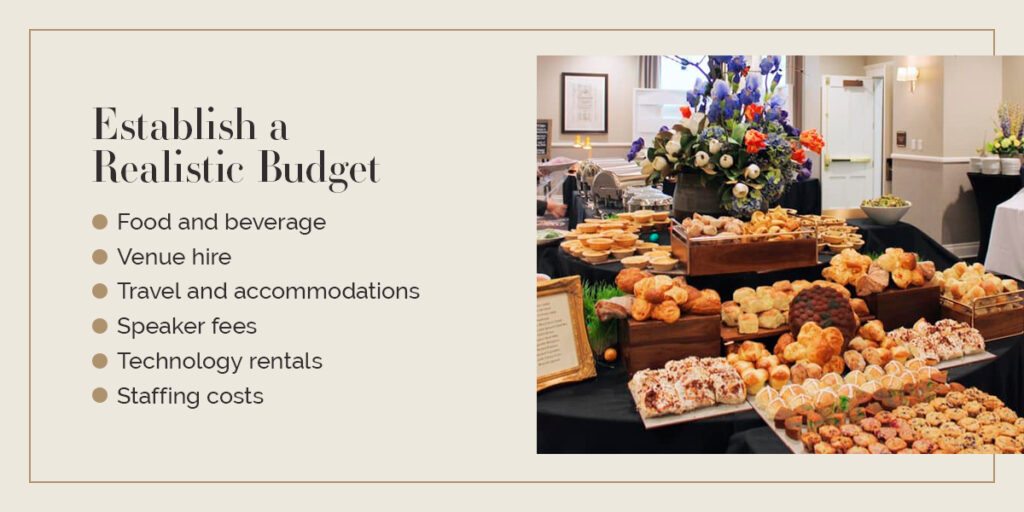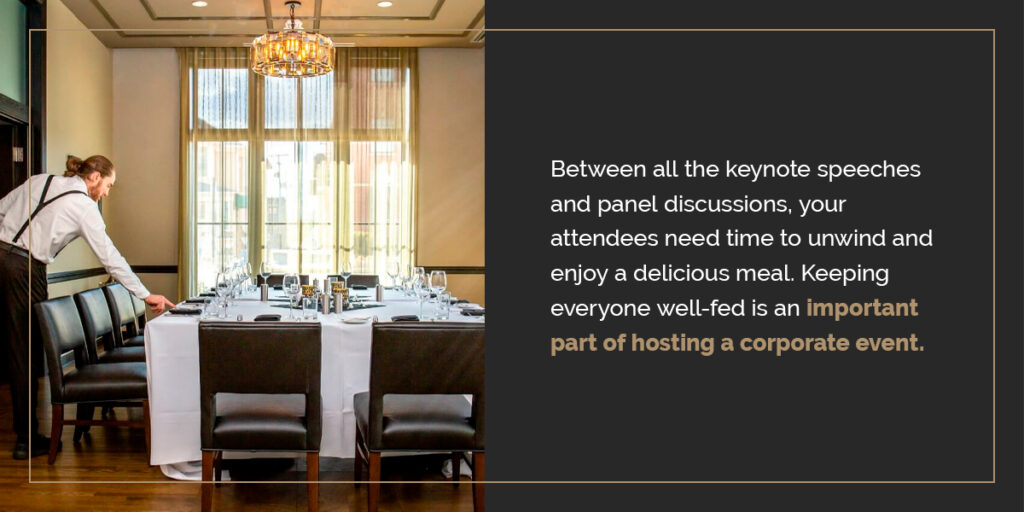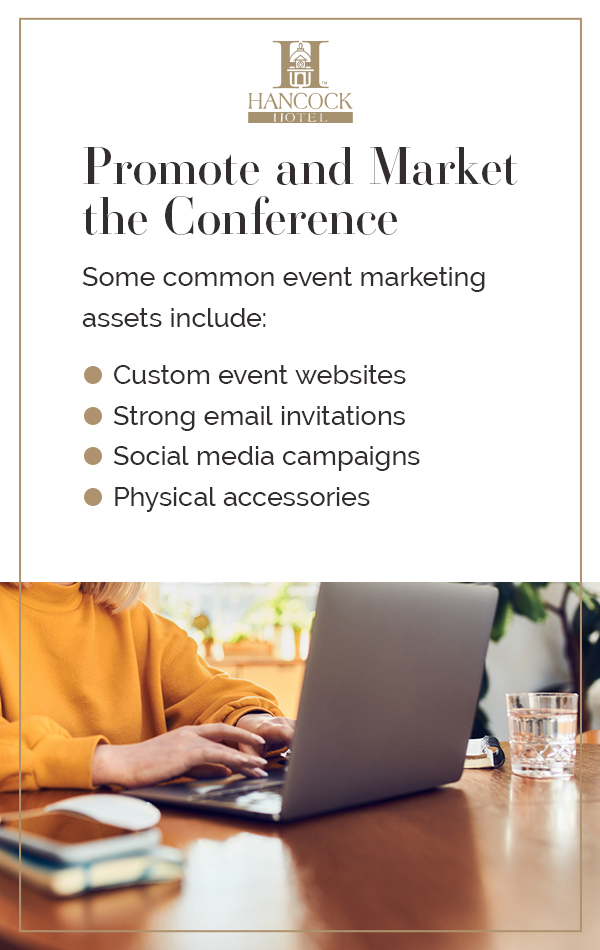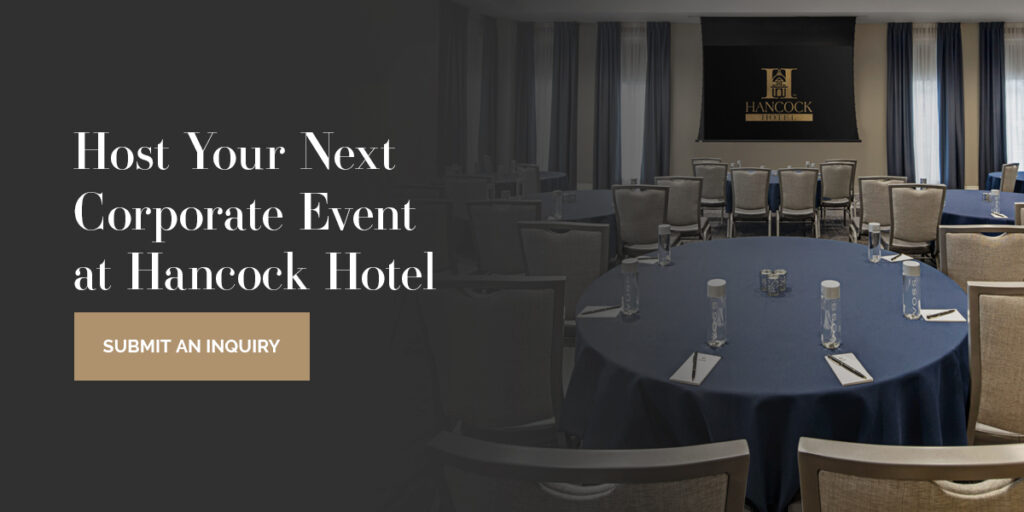Corporate events today are creative, engaging and memorable, and for good reason — they present excellent branding opportunities for internal and external attendees. Organizations need to invest careful time and energy into planning events that delight their audiences and drive results, and we’re here to help.
The following tips for planning a conference will help you ensure your event goes smoothly.
1. Define Your Objectives and Goals
Before you begin drafting a budget or booking speakers, the best thing to do is to define your goals for the event. Knowing what you want to accomplish provides a clearer picture of what you’ll need to do, which will help guide you in outlining your agenda.
This step is even more important if you’re working with an external event planner since you have a more intimate understanding of your company.
Some of the most common goals for corporate events include:
- Welcoming and training new employees
- Generating buzz for a new product or initiative
- Building stronger team bonds
- Developing brand awareness
- Reviewing company performance
- Showing appreciation for employees or customers
- Celebrating company milestones
Once you know what you want to achieve, you can start thinking about ways to accomplish this purpose in a way that resonates with your target audience.
2. Get to Know Your Audience
It’s critical to tailor the conference content and agenda to meet your audience’s needs — this is how you will achieve the goals you established in the previous step.
Depending on your event goals, your audience is likely to be made up of at least one of the following groups:
- Customers
- Employees and administrators
- Business partners
Choosing an event theme can help you create a more cohesive experience for your attendees. To come up with a theme, consider how your event’s objectives, your company’s offerings and your target audience intersect.

3. Establish a Realistic Budget
Conference budgeting is one of the most important parts of event planning because it helps ensure you don’t spend too much on any one piece of the event. First, consider where your funds are coming from. Is your company paying for everything, or will you have income from external sources like sponsors and exhibitors? Note how much each party will provide and add it to your grand total.
Then, consider all the possible expenses you might face, such as:
- Food and beverage
- Venue hire
- Travel and accommodations
- Speaker fees
- Technology rentals
- Staffing costs
Set a hard limit on each item to prevent overspending. If you’ve held a similar event in the past, you can refer back to its budget to see what vendors charged in the past. Note that economic factors like inflation may change vendor pricing.
Next, prioritize your expenses based on their importance and impact on the event. Find ways to keep the less important costs at a minimum. You can also negotiate with many vendors to bring costs down even more.
Keep in mind that most suppliers and vendors will provide you with estimates rather than fixed prices before the event, so you’ll also want to set up a contingency fund in the budget to account for unexpected costs and accidental overruns.
4. Select the Right Venue
Venue is everything when it comes to a successful event. You’ll want to make sure the venue provides enough space for everything on your agenda as well as a professional yet comfortable atmosphere. Some questions you’ll want to ask include:
- Does this venue make sense for your conference’s objectives?
- Will the space appeal to your target audience?
- Is there lodging in or near the venue your attendees can use?
- Is there enough parking for your attendees?
- What kinds of amenities does the venue offer?
Once you choose a space, book as early as possible to make sure you can get it. You’ll want to pick an event date that doesn’t conflict with major holidays and other local events — even if you can’t get the perfect date, though, it’s still possible to host a great event.
5. Create a Detailed Conference Timeline and Plan
Speaking of dates, when do you plan to hold your event? Depending on the size and scope of your event, your timeline might span anywhere from a few weeks to a whole year.
Be realistic about your event date. While you don’t want to choose a date that’s too far off, you still need to give yourself enough time to plan.
Here are some of the key event preparation tasks you’ll need to include in your timeline:
- Securing sponsors
- Booking speakers
- Locking in technical setup
- Scheduling tech rehearsals
- Coordinating vendors
- Marketing the event
Setting deadlines and milestones for these tasks is essential for staying on track. It can help to either appoint an internal planning committee or work with a professional event planner who can handle the more technical aspects of planning.
6. Develop an Engaging Conference Agenda
When planning a conference agenda, you should take care to include sessions that meet your attendees’ needs. Sending out a pre-event survey to your audience can help you get an idea of what they’re expecting from your event. For example, you could ask questions like:
- What kinds of networking opportunities do you prefer?
- What sessions do you find most valuable?
- What do you most want to get out of this event?
You can then use these answers to create event content that exceeds expectations and excites your attendees.
Extra Agenda Tips
Make sure to leave enough time between each item on the agenda for attendees to transition from session to session. This built-in time also provides a little extra flexibility in the event of technical difficulties or other delays.
Finally, it’s important to strike a balance between keynote presentations, panel discussions and interactive sessions. Audience participation is essential for maximizing engagement, but you want to make sure you provide a healthy mix of interactive and non-interactive sessions to avoid overwhelming your attendees.
7. Secure Qualified and Engaging Speakers
Keynote presentations, panel discussions and Q&As are some of the biggest draws of any corporate event. That’s why sourcing the right speakers is so important — you want to bring in people that your attendees want to see.
One of the best ways to find speakers is to ask within your professional network. Reaching out to colleagues and business partners for recommendations can help you find speakers you may never have heard of otherwise.
If you still need some guidance on how to find engaging conference speakers, consider checking:
- Social media: Most professional speakers post clips of their speeches on sites like Facebook, YouTube, Instagram and Twitter, which makes it easy to gauge whether they’d be a good fit for your event.
- Speaker organizations: Organizations like the National Speakers Association (NSA), the Public Speakers Association (PSA) and SpeakerHub help connect speakers with conferences and other events that make sense for them.
- Chamber of Commerce: Your local Chamber of Commerce could provide you with contact information for speakers they have used for past events.
Good speakers get booked up quickly — always book your speakers early to ensure they can make your event.

8. Consider Your Catering Options
Between all the keynote speeches and panel discussions, your attendees need time to unwind and enjoy a delicious meal. Keeping everyone well-fed is an important part of hosting a corporate event.
Some venues also provide their own catering services, so you can save time looking for other vendors. At Hancock Hotel, for example, our in-house restaurant, Mancy’s Steakhouse, is our sole caterer for events.
Account for Dietary Restrictions
Some of the most common dietary restrictions in the U.S. include:
- Food allergies
- Lactose intolerance
- Celiac disease
- Veganism and vegetarianism
- Religious practices
Providing a form attendees can fill out ahead of time can help your caterer account for these dietary restrictions, so you can ensure all your attendees feel seen and included.
9. Prepare for Contingencies and Crisis Management
Creating a risk management plan ahead of the event is a vital part of corporate event logistics, as it can help you overcome unexpected obstacles without affecting the event’s success. Outlining these procedures ahead of time can help minimize damage and protect attendees’ safety. Here are some key considerations for proactive crisis management:
- Health and safety measures: Do you have the proper staff and equipment in place in case someone experiences a serious medical emergency?
- Emergency protocols: What will happen in the event of an emergency like a natural disaster?
Taking the time to proactively consider every potential risk you could face is critical for preventing minor situations from becoming serious. Take extra care during this step if:
- Children or minors are attending your event
- Your caterer will serve alcohol
- You’re planning an especially large event
Essentially, if something could go wrong, it’s best to assume that it will and prepare accordingly.
Contingency Planning for Corporate Events
You need to have a contingency plan ready so you can keep the conference moving even if something does go wrong. For example, what would you do if a speaker’s microphone dies right before they’re about to go on? Having backup sound equipment on hand can help save the speaker — and you — from having to deal with a long delay.
Some other example contingency plans include:
- Inclement weather: Find an alternate indoor space you can use in case an outdoor session gets affected by bad weather.
- Equipment breakage: Technical equipment breakage is one of the most important issues to address. Hire additional staff to troubleshoot technical issues if and when they arise.
- Missing staff: Appoint one or two people to move through the venue and check on event staff at regular intervals. You could also hire more staff than needed to ensure coverage in case someone unexpectedly leaves their station.

10. Promote and Market the Conference
Once you have a date and venue set, you need to start promoting your event. While you won’t need to do as much for internal events, bringing in attendees from outside your company will require some extra work.
Using a combination of physical and digital elements to spread awareness is most effective. Some common event marketing assets include:
- Custom event websites: Start building the attendee experience before your event begins with a pre-event website attendees can use to access everything they need.
- Strong email invitations: When potential attendees feel personally called to an event, they’re more likely to engage with your offerings. That’s why sending personalized, visually appealing email invitations are essential for building anticipation for your event.
- Social media campaigns: Post fun reminders, teasers and giveaways to your social media pages and stories to build up excitement among your followers. Make sure to use the right tags so your posts get as much attention as possible.
- Physical accessories: Offering free “swag” to attendees is a popular branding technique for all sorts of events. These accessories could include anything from branded enamel pins to T-shirts to dog toys — it all depends on your target audience.
11. Gather Feedback and Evaluate Success
Attendee feedback helps you evaluate whether your event was truly successful. It can also be invaluable in determining how to make your next event even better. Sending follow-up surveys via email is a simple yet effective way to gauge how successful your event was. Keep the survey brief and send it out right away to maximize responses. Some questions you might ask include:
- How was your overall experience?
- Did you find the venue accessible?
- How were the food and beverage options?
- Would you attend another event with us?
- What about the event could be improved?
- What were your favorite and least favorite parts of the day?
Include event pictures and videos in your survey to help attendees remember key details of the event, like speaker names and panel discussions. It’s also important to add a Thank You page at the end of your survey to let the attendee know you appreciate their time. You can add links to event or company content to this page to help keep your brand top-of-mind even after submitting the survey.
Why Thorough Corporate Conference Planning Is Important
Careful planning is a vital part of ensuring your event goes smoothly. While hosting an event with minimal preparation is possible, a lack of conference program development often leads to significant difficulties.
So whether you’re launching an exciting new product or celebrating your company’s 50th anniversary, taking a proactive approach to event planning is best. Starting early helps ensure you can book the suppliers and speakers you want, secure a good venue and keep costs low. It also gives you plenty of time to build awareness for your event, which increases your chances of success.
